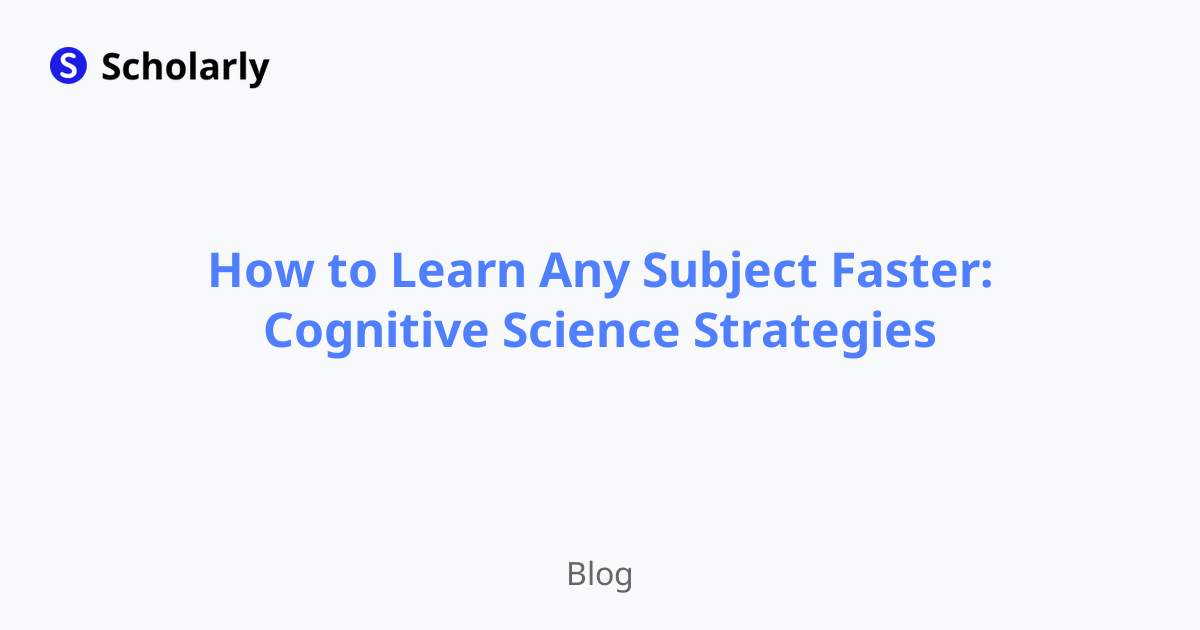How to Learn Any Subject Faster: Cognitive Science Strategies
Accelerate your learning using evidence-based cognitive science techniques. Discover how your brain actually learns and how to optimize the process for any subject.

Introduction
Learning doesn't have to be slow and painful. Cognitive science has revealed specific strategies that can dramatically accelerate how quickly you master new subjects. Whether you're tackling organic chemistry, constitutional law, or computer programming, the same evidence-based principles apply. This guide translates cutting-edge research into practical techniques that any college student can use to learn faster, remember longer, and understand deeper.
Methods
1. The Testing Effect
Principle: Retrieving information from memory strengthens learning more than passive review. Application:
- Close your book and try to recall what you just read
- Create practice questions and test yourself regularly
- Use flashcards for factual information
- Explain concepts out loud without notes
Research Finding: Students who test themselves remember 50% more information after one week compared to those who just re-read material.
2. Spaced Repetition
Principle: Reviewing material at increasing intervals optimizes long-term retention. Optimal Schedule:
- Day 1: Learn new material
- Day 2: First review
- Day 4: Second review
- Day 8: Third review
- Day 16: Fourth review
Tools: Use apps like Anki, Scholarly, or create your own spaced repetition schedule.
3. Interleaving Practice
Instead of: Studying one topic until mastery, then moving to the next Try: Mixing different but related topics within study sessions Example: When studying calculus, alternate between derivatives, integrals, and limits rather than spending hours on just derivatives.
Why It Works: Forces your brain to actively discriminate between concepts, strengthening understanding.
4. Elaborative Interrogation
Technique: Continuously ask yourself "why" and "how" questions Examples:
- "Why does this happen?"
- "How does this connect to what I already know?"
- "What would happen if I changed this variable?"
- "How is this similar to/different from...?"
Benefit: Creates rich mental connections that aid both understanding and recall.
5. Dual Coding
Principle: Information processed both visually and verbally is remembered better. Applications:
- Create diagrams for abstract concepts
- Use mind maps to visualize relationships
- Draw out processes and systems
- Convert verbal information into charts and graphs
6. The Generation Effect
Technique: Generate answers yourself before being given the solution Examples:
- Try to solve problems before looking at worked examples
- Predict what will happen next in a process
- Guess definitions before reading them
- Attempt to recall information before checking notes
Research: Self-generated information is remembered 2-3 times better than passively received information.
Benefits
- Dramatically Faster Learning: Evidence-based techniques can reduce learning time by 30-50%
- Better Long-term Retention: Information learned with these methods lasts much longer
- Improved Transfer: Skills and knowledge transfer better to new situations
- Enhanced Metacognition: Better awareness of your own learning process
Challenges
- Initial Effort: These techniques require more active engagement than passive reading
- Feels Harder: Active learning can feel more difficult, leading some to abandon it
- Time Investment: Setting up systems for spaced repetition and testing takes initial time
- Discipline Required: Consistent application is necessary for maximum benefit
Conclusion
The difference between fast and slow learners often isn't intelligence—it's technique. By applying these cognitive science principles consistently, you can dramatically accelerate your learning in any subject while building skills that will serve you throughout your academic and professional career.
Try Our Popular AI Study Tools
Transform your study materials into interactive learning experiences with our most popular AI-powered tools:
PDF to Flashcards
Convert lecture notes and textbooks into study flashcards instantly
Text to Flashcards
Turn any text or notes into comprehensive flashcard sets
Image to Flashcards
Convert diagrams and handwritten notes into digital flashcards
YouTube to Flashcards
Generate flashcards from educational video content



